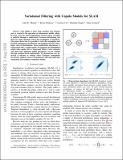Variational Filtering with Copula Models for SLAM
Author(s)
Martin, John D.; Doherty, Kevin; Cyr, Caralyn; Englot, Brendan; Leonard, John
DownloadSubmitted version (1.083Mb)
Open Access Policy
Open Access Policy
Creative Commons Attribution-Noncommercial-Share Alike
Terms of use
Metadata
Show full item recordAbstract
© 2020 IEEE. The ability to infer map variables and estimate pose is crucial to the operation of autonomous mobile robots. In most cases the shared dependency between these variables is modeled through a multivariate Gaussian distribution, but there are many situations where that assumption is unrealistic. Our paper shows how it is possible to relax this assumption and perform simultaneous localization and mapping (SLAM) with a larger class of distributions, whose multivariate dependency is represented with a copula model. We integrate the distribution model with copulas into a Sequential Monte Carlo estimator and show how unknown model parameters can be learned through gradient-based optimization. We demonstrate our approach is effective in settings where Gaussian assumptions are clearly violated, such as environments with uncertain data association and nonlinear transition models.
Date issued
2021-02Department
Massachusetts Institute of Technology. Department of Aeronautics and Astronautics; Massachusetts Institute of Technology. Computer Science and Artificial Intelligence Laboratory; Massachusetts Institute of Technology. Department of Mechanical EngineeringJournal
2020 IEEE/RSJ International Conference on Intelligent Robots and Systems (IROS)
Publisher
Institute of Electrical and Electronics Engineers (IEEE)
Citation
Martin, John D, Doherty, Kevin, Cyr, Caralyn, Englot, Brendan and Leonard, John. 2020. "Variational Filtering with Copula Models for SLAM." IEEE International Conference on Intelligent Robots and Systems.
Version: Original manuscript
ISBN
978-1-7281-6212-6
ISSN
2153-0866